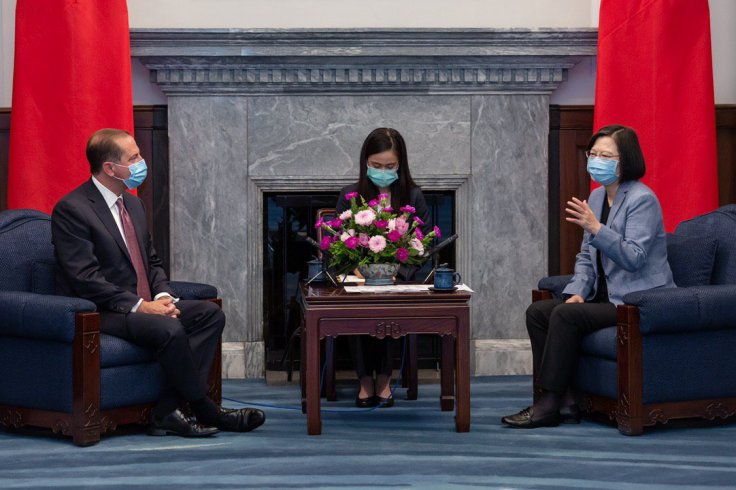Of late, the U.S. and China are not in a cordial relation, to say the least. Amid the trade war and Coronavirus pandemic, the U.S. has further escalated the situation by sending Health Secretary Alex Azar on an official visit to Taiwan.
Azar met with Taiwan's President Tsai Ing Wen and hailed the country's democracy while praising its COVID-19 response. In a parallel world, that could have been seen as a routine trip to an ally country. But it was not. It was an attempt to take a dig at China, which has always maintained Taiwan as a part of its mainland and not a sovereign state.
Thus, it has blocked every attempt from countries that have wanted to establish diplomatic ties. As for the U.S., the previous Presidents had tried to strike a balance and not stoke any tensions with a formal visit.

But not the current President Donald Trump, who is due for reelection in November 2020. The trip instead sent a message to Beijing following the enactment of National Security Law in self-administered Hong Kong and rising tensions. Azar said Trump had "conveyed a message of strong support and friendship with Taiwan."
"It is a true honor to be here to convey a message of strong support and friendship from President Trump to Taiwan," Azar said. "President Tsai's courage and vision in leading Taiwan's vibrant democracy are an inspiration to the region and to the world."
First Formal Visit in Four Decades
Azar's meeting with Tsai is the first official visit by a U.S. cabinet minister since 1979 when the country broke ties with Taiwan following a United Nations Resolution (No 2758) that declared the East Asian country as part of China.
Taiwan has diplomatic ties with only a handful of countries and the U.S. is obligated not to have one as it would anger Beijing. But Trump since assuming office in 2016 has tried to break the status quo. Before his inauguration, Trump had a "courtesy" phone call with Taiwanese counterpart Tsai that was seen as a move against Beijing. It was also the first time a U.S. President-elect of President had a conversation with Taiwan's President.

But the visit on August 10 was no courtesy, rather a calculated move from the U.S. to undermine Beijing's authority amid escalating tensions and denouncing the "One China" policy. While the U.S. may not be able to form any diplomatic relations with Taiwan as per the UN resolution, it can still cooperate in many other ways to hurt Beijing.
And it did. China's Foreign Ministry spokesperson Wang Wenbin on August 5 criticized the visit. "China firmly opposes any official interactions between the U.S. and Taiwan. This position is consistent and clear. For the China-U.S. relationship, the Taiwan question is one of the utmost importance with the highest level of sensitivity and the one-China principle is the political foundation," he said, urging the U.S. to adhere to the One China principle and stop making official interactions with Taiwan.
Taiwan's COVID-19 Response
While the White House and Trump repeatedly criticized China's COVID-19 response and labeled charges against Beijing for deliberately hiding facts about the pandemic, Azar praised Taiwan for its quick action.
Taiwan has been one of the rare success stories in containing the outbreak and it never had to impose a strict lockdown. So far, with a population of 23.8 million, only 480 confirmed COVID-19 cases have been reported with seven deaths.
"Taiwan's response to COVID-19 has been among the most successful in the world, and that is a tribute to the open, transparent, democratic nature of Taiwan's society and culture," Azar said praising Taiwan's response.
The U.S. will also sign a Memorandum of Understanding (MoU) with Taiwan for bilateral health cooperation. American Institute in Taiwan (AIT) Director Brent Christensen would sign the MoU with Taiwan Council for U.S. Affairs Chairperson Jenni Yang.
During the visit Azar also stated that the U.S. fought for Taiwan to be included as an observer in the World Health Assembly (WHA), a decision-making body of the World Health Organization (WHO). Currently, Beijing holds the seat in WHO and since Taiwan's sovereignty is not recognized, it doesn't have a say in any world body.
Tsai called the decision to block Taiwan from WHA "highly regrettable." She said that Taiwan could help countries fight the pandemic. "Political considerations should never take precedence over the right to health. The decision to bar Taiwan from participating in the WHA is a violation of the universal right to health," she said thanking the U.S. for its support.








